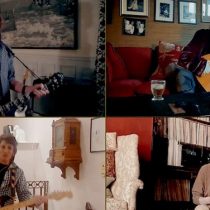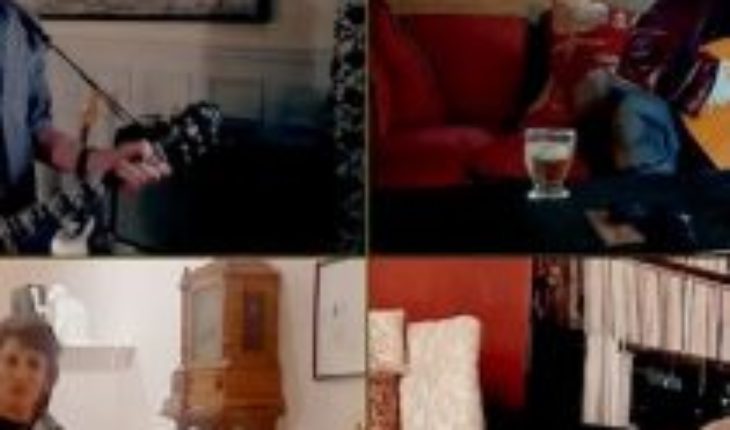
The screen appears divided into four black rectangles. In each of them you can read in small white letters the first name of the members (Mick, Keith, Ronnie, Charlie) followed by the word “camera”. During the confinement we have become accustomed to this new way of seeing and communicating, in order to keep the thread of our relationships; family, work and friendship.
The presentation was previously announced and was given in the context of “One World Together at home”, a worldwide broadcast curated by Lady Gaga as a tribute and way to raise money for health workers, held on Saturday, April 18, where musicians from around the world were featured.
The first camera to turn on is the upper left camera. Jagger, standing, wields an acoustic guitar. He’s wearing a blue shirt with white dots. We managed to appreciate a small corner of your home flanked by light curtains of red prints, could be flowers. Say hello, then ask if they’re all ready. He starts playing the first chords of “You can’t always get what you want” and when performing the opening verse (I saw her today at the reception) the second camera, the one on the upper right, is turned on. Richards sitting on a red-toned armchair just like the curtains covering the window. Next to him, on the support table a lit candle, his flame blinks slightly. Guitar in hand fuses to the vocalist concentrated in the vibration of his own instrument.
Jagger and Richard were schoolmates in the early 1950s. Then, due to the move the family the first lost contact. Thanks to a chance encounter on the platform of dartfort, Kent train station, they resumed their friendship by discovering their common passion for rhythm and blues. It was July 1960 and that day on platform two, each one’s gaze was nailed to the records the other wore. In music.
The third camera lights up when the chorus begins. Ronnie Wood plays the electric guitar standing next to an inexplicable palm tree, possibly towering from the first floor of his home. Richard’s hoarse voice supports Jagger’s in the repetition of the chorus “what you want”. The fourth chamber lights up at the beginning of the second stanza next to the percussion input. Charlie Watts, sitting on a small floor, almost flush with the floor, dressed in brown tones, strikes with his drumsticks the air, arm of an armchair, the metal boxes arranged in front of him, without drowning a playful smile. The band is complete.
“You can’t always get what you want” is part of the Eighth Rolling Stones studio album, the must-have 1969 “Let it bleed”. Disco full of powerful songs and that also marks the definitive departure of one of its founders; Brian Jones, who would drown in the pool of his house just a month after being expelled by the other band members.
According to Jagger, it was something he started improvising on acoustic guitar. One of those songs that is rehearsed in the bedroom, but it was eventually difficult to tax. “Charlie couldn’t play the groove, so Jimmy Miller (the producer) had to take over the percussion. We also began to get around the idea of including a Gospel choir in the final version.”
The theme of the song sums up the concerns of the sixties for politics, love, protest and drugs. Concerns that clearly don’t just be limited to a decade. We haven’t changed that much. Grace is in the certainty that communicates the pragmatism of the choir. We can’t always get what we want, but sometimes we can get what we need. It should not be forgotten that all these concepts are grouped within a melody and interpretation. Inside the music. Is there a consolation there?
Today, pretending to achieve what we want or want is beyond any possibility, the disease forces us to retreat. Perhaps, getting to define what we need can help us. I don’t know if the Stones suspected at the time, while solving the problems inside the studio in 1969, that the arrow of time, for them, would continue to fly fifty years later. And that your presentation of 5 minutes 37 second, would be the most commented on Saturday, April 18, 2020. Presentation, which, during that small span of time, frees us from this new domesticity; The one with the virus, the one about the lockdown. Eyes nailed to the screen. Ears in music.
The content poured into this opinion column is the sole responsibility of its author, and does not necessarily reflect the editorial line or position of El Mostrador.





